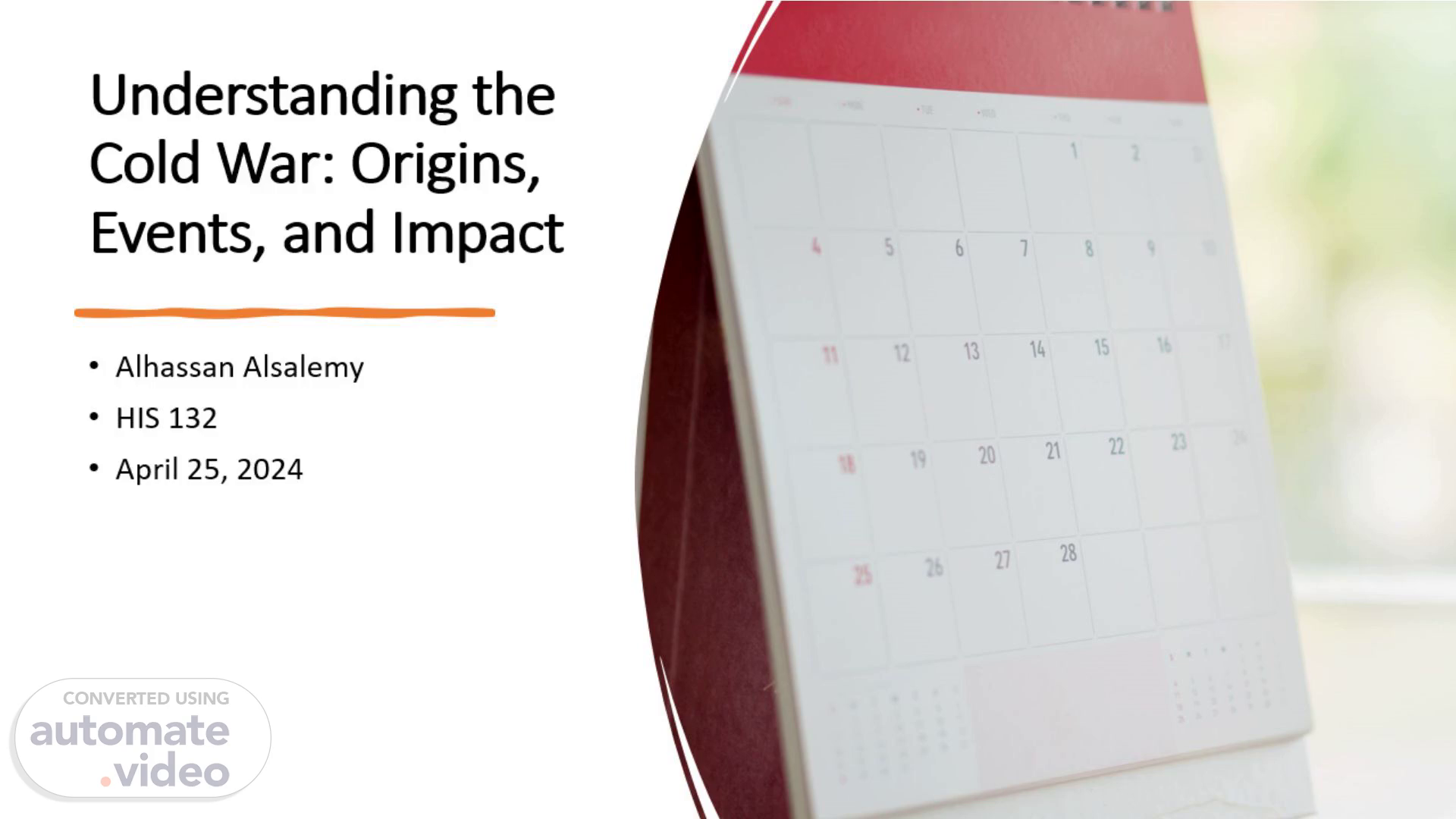
Understanding the Cold War: Origins, Events, and Impact
Scene 1 (0s)
[Audio] Understanding the Cold War: Origins Events and Impact Alhassan Alsalemy HIS 132 April 25 2024 Hi everyone. My name is Alhassan Alsalemy and today I'll be presenting on the topic "Understanding the Cold War: Origins Events and Impact" for my History 132 course. Let's explore the fascinating history of the Cold War and its significance in shaping modern international relations..
Scene 2 (32s)
[Audio] Origin and Synopsis of the Conflict The Cold War emerged post-World War II as a period of ideological and geopolitical rivalry between the United States and the Soviet Union. Key questions include: What were the origins of the Cold War? Who were the major combatants involved? Where were the primary geographical locations of conflict? Sources: www.flikr.com The Cold War emerged after World War II as a confrontation between the United States and the Soviet Union driven by ideological differences and geopolitical rivalry. Major combatants included the U S (and its allies) and the Soviet Union (and its allies). The conflict was global in scope with key battlegrounds in Europe Korea Vietnam and other regions..
Scene 3 (1m 24s)
[Audio] Political Perspective Political Interests of China China aimed to expand influence in Asia post-World War II. China was initially supportive of the Soviet Union but later became neutral due to ideological differences. This Photo by Unknown Author is licensed under CC BY-NC-ND During the Cold War countries like Brazil pursued neutrality to safeguard their sovereignty and economic interests. Political interests revolved around maintaining strategic autonomy and avoiding alignment with either the U S or Soviet blocs..
Scene 4 (2m 1s)
[Audio] Economic Perspective Economic Interests of India India sought economic development and stability during the Cold War. The conflict indirectly affected India's economy through global political alignments. This Photo by Unknown Author is licensed under CC BY-SA Economically countries such as Brazil sought stability amidst Cold War dynamics. The era was characterized by technological advancements fueled by the arms race and global trade dynamics influenced by political alignments..
Scene 5 (2m 34s)
[Audio] Social Perspective Social Interests of Brazil Brazil was not directly involved in the Cold War. The conflict's moral implications were not a significant societal issue in Brazil Socially everyday life in Cold War-era countries was shaped by contrasting lifestyles and cultural anxieties. Anti-war protests and cultural artifacts reflected societal responses to nuclear threats and geopolitical tensions..
Scene 6 (3m 0s)
[Audio] Resolution The Cold War concluded with the collapse of the Soviet Union in 1991 leading to the dissolution of communist regimes in Eastern Europe and the reunification of Germany. This marked a significant shift in global geopolitics. The Cold War concluded with the collapse of the Soviet Union in 1991 leading to the reunification of Germany and the end of the bipolar world order. The fall of the Berlin Wall symbolized the transition to a new era in global politics and international relations..
Scene 7 (3m 34s)
[Audio] Today the Cold War is viewed and taught differently across various countries. Understanding these perspectives provides insights into contemporary geopolitical dynamics and historical memory. Modern Connection Today countries like Brazil view the Cold War through a historical lens emphasizing regional stability and economic growth over ideological conflicts. Comparisons with the American perspective highlight unique interpretations of Cold War legacies and contemporary geopolitical dynamics..
Scene 8 (4m 8s)
[Audio] Sources Gaddis John Lewis. The Cold War: A New History. Penguin Books 2006. "Origins of the Cold War." Journal of American History vol. 95 no. 2 2008 pp. 524-538. Encyclopædia Britannica "Cold War." Encyclopædia Britannica Inc. Hall Richard C The Cold War: A Historical Almanac. Facts On File 2003. Library of Congress Cold War Collection. Library of Congress www.loc.gov/collections/cold-war. In conclusion the Cold War significantly influenced international relations and continues to impact modern geopolitics. Thank you for joining me on this exploration of the Cold War's origins events and impact. I welcome any questions or discussions you may have..